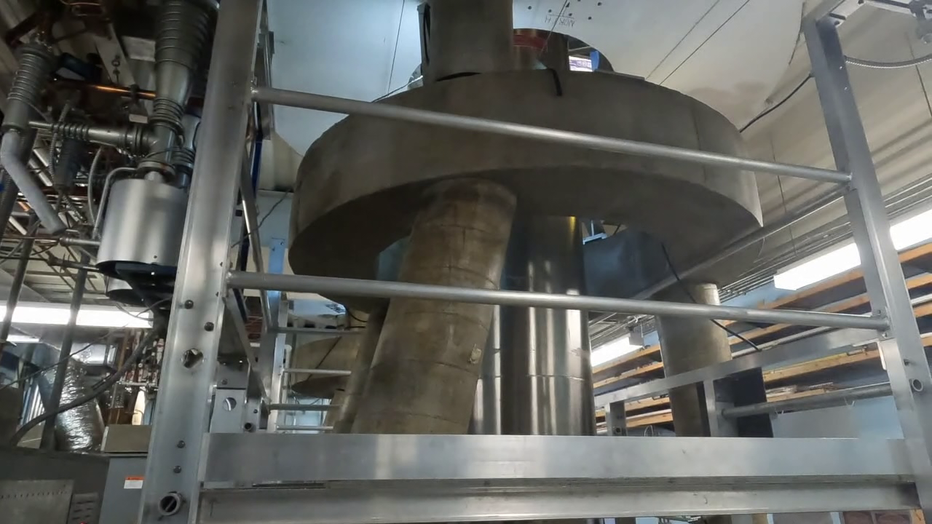FSU, UF partner to host the largest, highest-powered magnet lab in the world
Breakthroughs in Science: High-powered magnet lab
Florida scientists’ work in the National MagLab could lead to extraordinary discoveries, including much faster computers and other technological advancements.
TAMPA - Florida scientists are changing matter with powerful freezers and magnets and making extraordinary discoveries along the way.
Their work in the National MagLab could lead to much faster computers and much more.
It’s happening in some unique labs on the campuses of Florida State University and the University of Florida, as a partnership between Florida and Los Alamos National Laboratory.
UF invited FOX 13 to tour its laboratory known as the High B/T Facility.
"As part of the National MagLab, we are absolutely unique in North America to start. And we have unique capabilities that extend worldwide," said UF High B/T Facility Director Dr. Mark Meisel. "It’s going to make much more computing power available and smaller for everyone."

In concept, their process is simple. Think of a household freezer, but much larger and stronger. Unlike household refrigerators, their dilution refrigerators use more potent coolants.
"It's a refrigerator, like at home, we have a large number of mechanical pumps that provide the vacuums we need," said Dr. Meisel. "We use a mix of helium and helium 4 gas, those blended isotopes to get this refrigerant to run. It looks like your thermos bottle for your coffee, same principle but the first layer inside is 4-kelvin it's liquid helium temperatures."
They put samples of material inside the freeze chamber, and then zap it with intense electromagnets, which all cool and slow the electrons within.
"When you start to push different materials toward these more extreme environments, the physics start to change. Things get a little different and strange," said UF Post Doctoral Associate Nicolas Silva.
They freeze and magnetize a sample of a substance like graphene, because it can peel off in very thin layers, making it easier to see. The super cold temps and intense magnetic forces slow down the speeding electrons inside the sample, and that removes the blur of movements that otherwise conceal how they wiggle around.
Some researchers compare it to burning off a heavy fog to reveal the details of a hidden city within. Dr. Meisel likens it to weeding a garden as you get about as close to absolute zero as you can possibly get.
"Every time we lower the temp by a factor of ten, we weed our garden a thousandfold," he said.
That exposes the inner secrets of matter, which gives us the knowledge to optimize it to enhance our lives. Scientists reveal the strange things that happen in extreme conditions, so engineers can figure out how to make the next great leaps in normal conditions. In general, that’s what we call condensed matter physics, which has already helped us develop MRI machines and other innovations we now often take for granted. And the work they’re currently doing could lead to much more like levitating trains that could travel as fast as jets.
"Those high-speed trains reducing friction they have with the ground," said Silva.
Studying superconducting material that forms in extreme cold could also produce superconductors at room temperature, making our energy systems more efficient.
The experiments could help lead us into the age of quantum computers. The early prototypes can compute exponentially faster than the most powerful systems we use today by harnessing subatomic particles called qubits.
"So those particular quantum computers you mention now are operating at or near 10 Mini Kelvin," said Dr. Meisel.
The prototypes developed in ultra-cold environments are being studied and reengineered for future widespread use as we speak. Dr. Meisel said the experiments in the National Mag also carry the promise and potential of new and unexpected discoveries.
"We need to explore our frontiers all the time because history tells us when that stops happening, those civilizations collapse upon themselves," he said.
The National Mag Lab is funded in partnership with the National Science Foundation and the State of Florida. The facilities at FSU and UF host experiments from scientists around the world. They offer some public events and tours throughout the year in Tallahassee and Gainesville. You'll find the details at NationalMagLab.org.
SIGN UP: Click here to sign up for the FOX 13 daily newsletter

